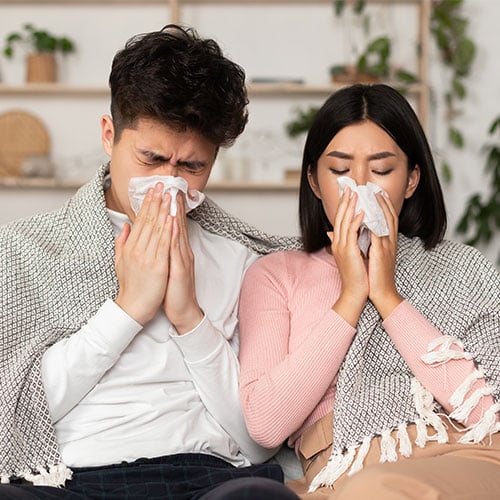Sniffles, runny or stuffy nose, body pains, and/or a mild headache – when you have any (or even all) of these symptoms, you know you are about to go down with a cold. While most cases tend to resolve quickly, dealing with them can be a chore as it can affect your daily routine.
But have you ever wondered why people are affected by the common cold? Take note of these facts that can help you understand how and why it happens.
- The common cold is caused by viruses, particularly rhinoviruses. It is said that up to 50% of common colds are triggered by rhinoviruses. However, common colds can also be caused by the coronavirus, respiratory syncytial virus (RSV), or parainfluenza. Symptoms usually appear one to three days after initial exposure.
- Cold viruses enter your body through three different pathways: the mouth, eyes, or nose. Someone with a cold can spread the virus responsible for it when they cough, sneeze, or talk. You can also breathe in droplets containing the virus through the mouth or nose, allowing it to make its way into your body.
It is also possible to get the cold-causing virus through hand-to-hand contact with an infected person, or when you touch and/or share surfaces or items with someone with a cold. Once you touch your eyes, nose, or mouth after the said contact, the virus can then travel through the body. - An adult experiences colds two to three times a year. Meanwhile, children can deal with colds four or more times a year. This is because kids’ immune systems are not able to fully distinguish and address cold-causing viruses yet. Once an adult, the immune system is already familiar with the viruses that cause colds, and can deal with them accordingly.
Additionally, when kids are together, especially at school, they often do not cover their mouths when they sneeze or cough. They also have a habit of touching their faces with dirty hands, allowing the virus to spread quickly. - While colds usually occur on chilly days, cold weather is not a direct cause of colds. However, lower temperatures CAN affect how the virus travels. Cold-causing viruses can spread more rapidly in cooler environments. Furthermore, since humidity is low during chilly days, your nasal passages can become more dry and more susceptible to cold-causing viruses.
- There is actually no known cure for a common cold. Health experts advise that you should let the cold “run its course.” At the same time though, you should be taking measures to strengthen your immunity and prevent cold-causing viruses from spreading. If you have a cold, make sure that you:
- Get enough high-quality sleep.
- Eat nutrient-rich food like chicken soup, broths, oranges, lemons, and berries.
- Drink plenty of fluids to avoid dehydration
- Avoid sugary food since these may weaken your immune system.
- Avoid going to schools, offices, or other public places to prevent the spread of cold-causing viruses.
- Refrain from kissing, hugging, or shaking hands with people.
- Wash your hands with soap and water to ensure that they are free from germs, viruses, and bacteria.
- If you need to cough or sneeze, move away from people and cover your mouth. Make sure to cough or sneeze into a piece of tissue or your shirt sleeve.
However, if the symptoms become bothersome, ask your doctor about over-the-counter (OTC) medicines that can help counter cold symptoms.
A decongestant can be recommended too since it may help target a bothersome stuffy nose, as well as congested sinus openings and passageways.
Seek medical attention if symptoms still persist despite initial treatment. If you experience persistent moderate to high grade fever, severe sore throat and headache, these may already be indicators of health issues that need urgent attention.
References:
https://my.clevelandclinic.org/health/diseases/12342-common-cold
https://www.cdc.gov/features/rhinoviruses/index.html
https://www.hopkinsmedicine.org/health/conditions-and-diseases/common-cold
https://www.mayoclinic.org/diseases-conditions/common-cold/symptoms-causes/syc-20351605
https://www.webmd.com/cold-and-flu/cold-guide/common_cold_causes
https://www.medicalnewstoday.com/articles/323431
https://www.medicalnewstoday.com/articles/321786
https://www.healthline.com/health/common-cold-risk-factors#seasons
https://www.healthline.com/nutrition/15-best-foods-when-sick
https://www.piedmont.org/living-better/foods-and-drinks-that-compromise-your-immune-system








